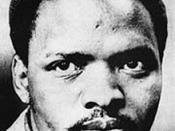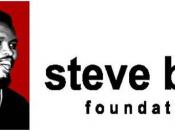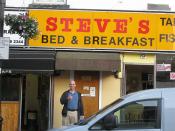I Write What I Like By Steve Biko "You are either alive and proud or you are dead"æ"(Biko 152). Steve Biko was proud to be alive and proud to be black. This book is made up of essays, articles, speeches, and interviews of Steve Biko. Steve Biko has a very unique and interesting style of rhetoric. He is humorous and yet serious at the same time. His rhetoric is very influential and yet it has a very friendly and relaxed tone to it. These things combined make his writings very easy and enjoyable to read. The book takes a chronological look at Steve Biko's writings between 1969, the time in which he became the president of SASO and 1978, shortly before his detention and then death. Steve Biko is an authority on the struggle of blacks (mainly students) in South Africa. SASO stands for the South African Student Organization. He became an authority by living and experiencing it all first hand. After reading this book I think that Steve Biko has really captured a hold of what blacks have to do to win their independence. As the book goes on one can start to see how Steve's views and ideas change and evolve as he experiences more and more.
After Steve became president of SASO he wrote down the aims and goals of SASO. What we want is not black visibility but real black participation (Biko 4). Steve made it clear that SASO was not challenging NUSAS as the true national union of students in South Africa. But he did say that SASO criticizes the dichotomy between principle and practice found in the organization. The main point in all of the writings in this book relate to black consciousness blacks taking control of their own lives, starting with their view of themselves as a black individual. Being black is not a matter of pigmentation "" being black is a reflection of a mental attitude (Biko 48). Steve goes on to say that being black is not an aberration from the "normal" which is white. In order for blacks to get rid of their subservient roles in South African society, they first have to be proud to be black. To emulate the white man, blacks are insulting the intelligence of whoever created them black (Biko 48). Steve explains how blacks have to fight for their own freedoms and rights. White liberals can not fight for a race that they do not even belong to. A white man will never be able to be black, he will always be white which inherently takes away his ability to understand what blacks want and what they are going through. Steve gives the example of how a white man can always take from the advantages of being white whether he disagrees with it or not, he will never really experience being black. This leads Steve to believe that a student organization fighting for the rights of blacks like SASO can not be led by whites as in most cases. These organizations have to run and fought with blacks themselves. If blacks supported an organization that only whites became leaders of they would be support the apartheid way of thinking. Steve is also quick to note that these whites mean well but that there is no place for them in a black organization. White's often become very offended when Steve says that they can not be involved in his organization. But if these whites were really acting with blacks being the first priority in their mind, then they would be ecstatic to see blacks taking responsibility for themselves and banning together to get rid of the apartheid. Steve tries to make his fellow blacks realize that the most potent weapon in the hands of the oppressor is the mind of the oppressed. As one may start to realize Steve's main arguments involve the self-image of blacks, he believes this is the key to black freedom physically and spiritually. One of the main goals for Steve was to make blacks realize that they have the power in themselves to end racism and became an equal if not better race than whites. The key to all of this is the soul of the black man. Once the black man lets his soul out it will take on a form of itself that will take over and engulf white racism. One quote from Steve really sums up what he is thinking regarding whites and whites racism. This quote is also interesting because it shows a more powerful side of Steve that does not come out much in his writings.
We have in us the will to live through these trying times; over the years we have attained moral superiority over the white man; we shall watch as time destroys his paper castles and know that all these little pranks were but frantic attempts of frightened little people to convince each other that they can control the minds and bodies of indigenous people of Africa indefinitely.---Steve Biko As one can see this quote is one of the few times Steve lets his anger out. It also shows his confidence in himself and blacks as a people. Steve has some interesting thoughts on confrontations with whites and the government. He says that the best way to get to the heart of him is to talk and give your argument eloquently and respectful no matter what it is about. If one does this than Steve will listen and return with his side just as eloquently. The worst thing to do is use violence, force, or intimidation. If someone uses these ways to confront Steve he will shut down and not even view the person as someone worth talking to at all.
The intended audience of Steve's writings is widely dispersed. The audience includes students, religious leaders, presidents of other organizations, and even testimony. In each instance Steve alters the way he presents his argument, molding it to the intended audience. When he is writing to fellow black students in the SASO organization he uses are more powerful and moving type of rhetoric. He does this to get the black students to become motivated and to create an initiative to change society. At the same time when he is talking to religious leaders he alters his type of rhetoric. He tones down his style of writing and becomes a little more conservative. He does this without losing any of the inspiration of the writing. Steve's ability to alter his rhetoric to his audience accordingly made him amazing at influencing and motivating people through his writings.
I thought that this book was amazing. I am surprised that I have never heard of Steve Biko or his writing's before this. This book really affected me, more than any of the black leaders we have studied. I think this is because I agree with Many of Steve's views on how racism should be dealt with and what blacks can do to stop it. I was actually moved when I read some of his writings. He has a very motivating and interesting way of writing. He is also very confident which shines through in his writing. His confidence in himself and blacks in general can be seen in his writing and I am sure it gives any blacks who read it confidence in themselves and that much more proud to be a part of black society. This I believe is one of Steve Biko's main goals in his writing. He believed that the fight has to be fought in the black mans mind and soul before he can fight racism in society. Once a black man can be proud of being black the power of this pride will engulf racism and he can stand next to whites being proud to be black. I am going to end with part of a quote that Steve Biko liked.
To take part in the African revolution, it is not enough to write a revolutionary song; you must fashion it with the people , the songs will come by themselves and of themselves"æIn order to achieve real action you must yourself be a living part of Africa and of her thought"æThere is no place outside that fight for the artist or for the intellectual who is not himself concerned with, and completely at one with the people in the great battle of Africa and of suffering humanity.----Sekou Toure





